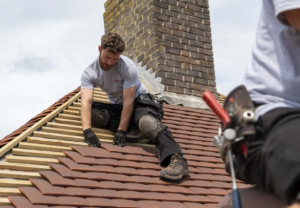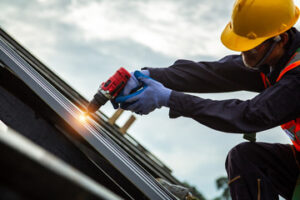Pressure washing is an efficient way to clean the dirt, mildew, and grime from your house. It’s also an important step in preparing your home for painting.
Before starting, always test the pressure washer in an inconspicuous area to ensure that it doesn’t damage the cleaned surface. Some systems have multiple nozzle options that change the spray pattern and force of the water. Contact Pressure Washing Austin Texas now!

Pressure washing, also known as power washing, is the process of spraying high-pressure water onto surfaces to remove loose paint, mold, mildew, dust, mud, and dirt. This cleaning method is ideal for surfaces that are not easily cleaned by scrubbing or household cleaners, such as concrete, brick, and masonry. It can also be used to clean vehicles and other equipment. It can be dangerous if not used properly, so it is important to wear protective clothing and use a professional machine with proper safety precautions.
When using a pressure washer, it is important to use the appropriate settings for each surface. Higher pressure may damage certain materials and can cause serious injury if not used correctly. It is also recommended to test the machine on a small, inconspicuous area before using it on larger surfaces to ensure it will not cause harm or damage. The spray from a pressure washer can also be hard to control, so it is important to move steadily and keep the nozzle at a safe distance from the surface being cleaned.
The high-pressure water blast from a pressure washer has kinetic energy that helps to break the bonds between the surface and unwanted substances, making them easier to remove. In addition, the force of the water jet creates turbulence that further aids in the removal of contaminants. Some machines also have the ability to add soap or detergent to the water, which can further enhance the cleaning process. When using a soap or detergent with a pressure washer, it is important to follow the recommended dilution ratios and avoid over-saturating surfaces, as this can cause damage.
While pressure washing can be effective on most surfaces, it is important to be aware of the limitations of this cleaning method. Some surfaces, such as asphalt roofing and some types of siding, are easily damaged by high-pressure water. It is also important to know that this cleaning technique may not be able to fully remove all types of stains, especially those caused by grease and oil. In these cases, it may be necessary to use alternative cleaning methods.
Nozzles
Nozzles are a key attachment to pressure washers that provide specific spray patterns or serve other purposes. Nozzles are available in a variety of shapes and sizes, so it’s important to select one that fits your pressure washer and cleaning task.
Nozzle sizes are typically stamped on the nozzle, so you can easily identify the nozzle size for the pressure washer you’re using. Nozzles are also rated for a certain volume and pressure, so it’s important to use the correct nozzle for your machine. Using the wrong nozzle size can ruin the pump or damage the surface you’re trying to clean, so it’s important to read the nozzle sizing chart that comes with your equipment.
Yellow nozzles have a powerful, concentrated stream of water that’s ideal for cutting through stubborn dirt or grime. These nozzles are good for washing concrete or metal, but aren’t recommended for wood or siding, as the strong flow could damage these softer materials.
Green nozzles offer a moderately powerful stream with slightly broader coverage, making them ideal for most general-purpose cleaning tasks. These nozzles are good for cleaning patio furniture, decks and houses, and are a great choice for prepping surfaces before painting or sealing.
White nozzles have a wide, low-pressure spray that’s perfect for rinsing delicate surfaces like glass, ceramics and windows. These nozzles are also good for washing patio doors and driveways, as well as car exteriors and interiors.
Black 65-degree nozzles have the lowest spray pressure of all the standard nozzles and deliver a gentle, wide pattern. They’re used with soap dispensers to apply detergent and are excellent for rinsing ceramic tiles, windows and cars.
It’s also helpful to keep a couple of spare nozzles on hand, especially for difficult cleaning tasks. You may need to change nozzles several times during a single cleaning project to get the job done quickly and thoroughly. You should also switch nozzles if you’re moving between hard and soft surfaces. If you’re unsure what nozzle to use, try a smaller one at first and then move up to a wider nozzle if needed.
Water
Pressure Washing uses high-powered jets of water to clean mud, dust, grime, loose paint, moss, algae and residue from surfaces. In addition to its aesthetic benefits, regular cleaning by a professional pressure washing company can help protect your home or commercial building from damage. It also eliminates bacteria and makes the environment less hospitable to vermin, and can even reduce the spread of illness among employees or visitors.
A dirty exterior can be a turn-off for potential buyers, which can lower your home or commercial property value. Regular pressure washing with a professional company can help restore your building’s surface to its original appearance and boost curb appeal, making it more appealing to potential buyers. In fact, some real estate agents recommend that home owners invest in a pressure wash before listing their property, in order to boost its appeal and increase the selling price.
The best part about professional pressure washing is that it’s a safe and environmentally friendly way to get your home or business clean. Unlike traditional chemical cleaners, which can be dangerous for pets and children, pressure washing uses water that’s already on-site to remove contaminants from your building or outdoor spaces.
Regular pressure washing will also extend the life of your building’s paint and other materials. By removing dirt, mildew, mold and other debris before it can cause permanent damage, pressure washing is an effective way to prevent costly maintenance and repairs in the future.
When your house’s siding develops a layer of mildew, dirt, or moss, it can become a breeding ground for harmful organisms that can affect the health of your family. These organisms can trigger allergies and breathing problems, so it’s important to keep them at bay with routine cleaning. By using a professional pressure washer, you can get rid of these harmful organisms and restore your siding to its original condition.
Pressure washing is a great choice for a wide variety of residential, commercial and industrial spaces, including roofs, gutters, driveways, sidewalks, patios, pools, and decks. A professional will know the right setting for the water temperature and pressure based on the type of material your space is made from. For example, a wood deck will require different settings than vinyl siding or concrete.
Safety
Pressure washing can be extremely effective for heavy-duty cleaning tasks such as oil-stained driveways, heavily soiled concrete and areas with deep mould or mildew build up. However, the high water temperatures and immense pressure of these machines can be harmful to surfaces and if not used properly, can cause severe injury.
Power washers create a narrow stream of water travelling at 3,300 kilometers per hour that can easily damage surfaces and penetrate skin. This force is why it is imperative that only those with the proper training use these powerful tools and follow all safety measures outlined in the owner’s manual.
Before turning on a powered pressure washer, always perform a visual inspection of the area and become familiar with the equipment. Survey your surroundings for tripping hazards, traffic, pets and other people who could be injured by the spray of water. Keep the nozzle pointed away from unprotected skin and eyes, and never aim the wand at any person or animal, as the water can cause severe injuries.
The high-pressure water enters the machine from a spigot or tank via a garden hose and is then speeded on its way to the nozzle by a high-pressure pump. As the water passes through the nozzle, it becomes heated to between 200 and 240 degrees Fahrenheit, depending on the model of the pressure washer. This temperature is important to help remove stubborn, greasy stains and degreasers. The nozzle also has various settings that can control the amount of pressure and flow of water for safe, effective cleaning on all surfaces.
When using a pressure washer, only use detergents approved for your specific model of power washer and make sure that the detergent is diluted correctly to ensure it doesn’t clog the pump. It is also important to have a fully-unravelled high-pressure hose to prevent kinks that can restrict the flow of water and spot-test in an inconspicuous area before using.
It is also a good idea to use extension cords that are designed for wet conditions and only plug the power washer into a grounded outlet. Finally, never use a gas model indoors, and keep it away from flammable objects like paint thinners. If you do not have the necessary experience or safety precautions in place, it is best to hire a professional to handle your power washing.

